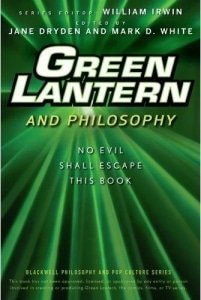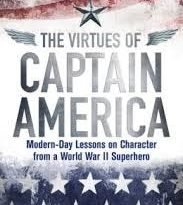Green Lantern And Philosophy edited by Jane Dryden and Mark D. White (book review).
Interestingly, ‘Green Lantern And Philosophy’ starts off with the Green Lantern Corps before moving on specifically to that of the Earth Green Lantern, Hal Jordan and his back-up team in the opening section of this book. If anything, Earth seems to be unique for the number of Lanterns it has because it doesn’t appear to have many recognisable back-ups in other sectors or at least one’s we’ve seen. Then again, when you consider the number of meta-humans on Earth, this number might be in proportion to having the necessary talent. After all, it takes a lot of will power to control these power rings and the traits of fearlessness and honesty aren’t likely to be prime abilities for that whereas forceful spirit might well be. Considering the potential mortality rate of the Lanterns, perhaps it would be wise to at least to have more back-ups in the wings so to speak.
Andrew Terjesen points out that people that are totally fearless are not exactly good people, mostly because they will have a tendency to be reckless. If anything, based off of this Guy Gardner is probably the more archetypal Green Lantern than Hal Jordan or John Stewart. I would contest the majority of the selection of Green Lanterns isn’t solely made by the Guardians but by the power ring needing a new owner. The best example of that was the dying Abin Sur asks his power ring to seek out his replacement after all. Although the argument is given that Jordan wasn’t the best choice but the closest to Abin Sur, considering the speed these power rings can move people, I would have thought that distance wouldn’t have been a problem on a terrestrial scale. Only a few of these writers point out the significant factor of enrolment is honesty but that must vary from species to species or how else did Sinestro become a tyrant? Then again, he was a forceful personality. Even evil has its own level of honesty. Y0u don’t see evil people disliking their own deeds. Surely there should be more qualifications than fearlessness and honesty?
Oddly, none of the philosophers in this book point out that the Green Lantern Corps was a comicbook interpretation and template from EE ‘Doc’ Smith’s Lensmen police force.
The recent rainbow of various Lantern forces did raise an eyebrow from me when I first read the stories a couple years back. As if we didn’t have enough teams out there already. If colours were geared to emotions then surely green would be the colour of envy than will power but maybe that’s all to do with interpretation, especially as some of the philosophers here point out that green is in the middle of the colours of the spectrum as if that would mean something. I mean, green is also the colour of go (not the game) which could also mean will-power. Then again, when Julius Schwartz resurrected Green Lantern back in the 60s, he was making it a more Science Fiction version than the Green Lantern/Alan Scott version, the original magic based version of the 1950s and kept the bright colour.
The examination of Hal Jordan focuses on two main areas of his life. His social awareness and development when he teamed up with Green Arrow in the Dennis O’Neil/Neal Adams era and many decades later when he ‘turned evil’, destroying the Corps and its people when he was possessed by Parallax. If you haven’t read either of these stories, there is sufficient information given to clue you up on them here.
Something that did strike me about the Corps, after all these years, is that its officers aren’t actually paid for their activities. They might have the most mightiest single weapon in the cosmos, the perks of a free uniform, unlimited travel and such but they are not paid nor have a good pension plan let alone might not survive a lifetime. Enlistment isn’t always voluntary come to that.
I’m not altogether sure if the definition of the power ring being all powerful is actually true. Anything created by it only exists as long as will power supports it. Without that, things just dematerialise again. Nothing is permanent. All Green Lanterns are vulnerable at the end of twenty-four hours and at the point of charging. The charge itself isn’t actually like a battery neither. I mean, it doesn’t diminish in charge until the end of twenty-four hours. Let’s not even explore why all planets these Green Lanterns come from have the same twenty-four day as Earth.
Daniel P. Malloy does investigate the lack of imagination by many of the Lanterns when it comes to the constructs these people create in the course of their duties. He takes issue with many of them resorting to an energised boxing gloves in battle but considering the tend to be speed flying, avoiding being hit and fighting back, you’re going to create something basic. It must take a lot of will power to sustain a complex object after all.
Only Amy Kind steps away from the comicbook version to look at the animated John Stewart version in the ‘Justice League Unlimited’ series, examining his dilemmas with split love between Hawkgirl and Vixen.
Not sure if I agree with the sentiment that Lanterns whose names end in ‘o’ are always likely to turn villainous. If that’s the case of the still living (so far) Lanterns so far, Aldo, Kho, Maro, Matoo, Mogo, Morro and Okonoko are going to be a future problem. Who wants to see Mogo the living planet get out of hand?
Compared to the other ‘Philosophy’ books that Wiley has released, the various aspects here focus on the use of power by a somewhat military galactic force raises many issues. If anything, there is much here that could be explored further. It would be interesting to see a book of this nature be written about the Legion Of Super-Heroes because there are many parallels to the independent power they possess that allows them to work alongside the Science Police but not controlled by them. I do hope the writers of ‘Green Lantern’ read this book because there is much fodder here that they could influence the direction of their stories.
GF Willmetts
(pub: Wiley-Blackwell. 292 page indexed enlarged paperback. Price: £11.99), $17.95 (US), $ 21.95 (CAN). ISBN: 978-1-470-57557-4)
check out website: www.wiley.com/wiley-blackwell






